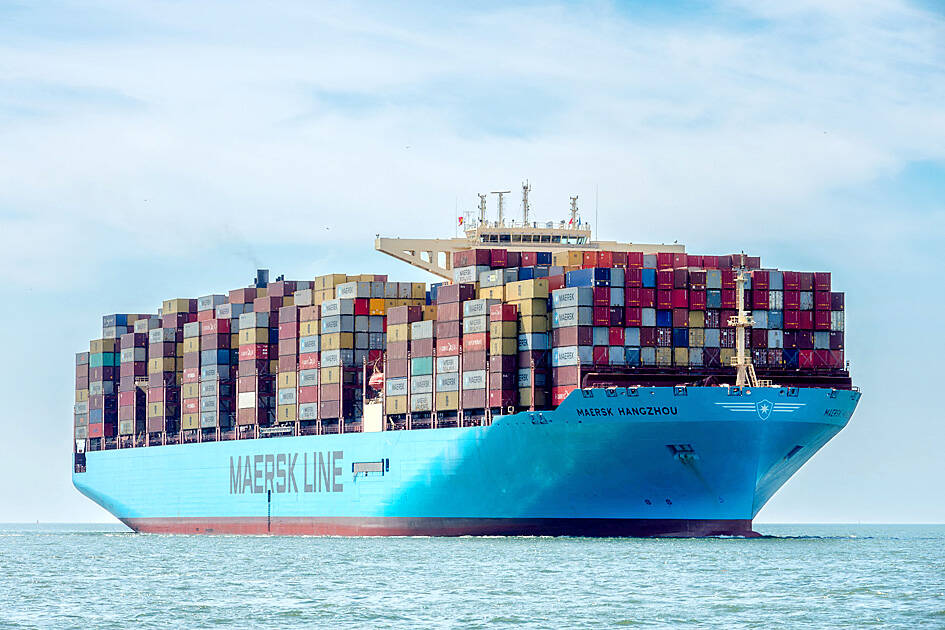The disruption to container shipping traffic in the Red Sea is increasing and is expected to reduce the industry’s capacity between the Far East and Europe by up to 20 percent in the second quarter, shipping group A.P. Moller-Maersk A/S said on Monday.
Maersk and other shipping companies have diverted vessels around Africa’s Cape of Good Hope since December last year to avoid attacks by Iran-aligned Houthi militants in the Red Sea, with the longer voyage times pushing freight rates higher.
“The risk zone has expanded, and attacks are reaching further offshore,” Maersk said in an updated advisory to customers.

Photo: This Image has been supplied by a third party, Reuters
“This has forced our vessels to lengthen their journey further, resulting in additional time and costs to get your cargo to its destination for the time being,” it added.
By routing traffic away from the Suez Canal, Maersk estimated that the container industry’s capacity between the Far East and northern Europe and the Mediterranean would be cut by between 15 and 20 percent in the April-to-June quarter.
A company spokesperson said the situation in the Red Sea remained complex and continued to evolve.
The Danish group, viewed as a barometer of world trade, last week said that shipping disruptions were expected to last at least until the end of the year, although Germany’s Hapag-Lloyd AG sounded a slightly more optimistic note, saying it believes the crisis can be overcome before the end of this year.
France’s CMA CGM SA is still sending some vessels via the Red Sea escorted by French or other European navy frigates, but the majority of its ships are being rerouted around Africa, chief executive officer and chair Rodolphe Saade told daily newspaper Le Monde.
“The problem is that you have to call at ports that are not the final destination and to transship onto smaller vessels,” Saade told the newspaper in an interview published yesterday.
“Tangiers is saturated and alternatives need to be found — like [Spain’s] Algeciras or Valencia,” he added.
The knock-on effects of voyages around Africa included bottlenecks and so-called vessel bunching, where several ships arrive at port at the same time, as well as equipment and capacity shortages.
“We are doing what we can to boost reliability, including sailing faster and adding capacity,” Maersk said, adding that it had so far leased more than 125,000 additional containers.
“We have added capacity, where possible, in line with our customers’ needs,” the company said.

PATENTS: MediaTek Inc said it would not comment on ongoing legal cases, but does not expect the legal action by Huawei to affect its business operations Smartphone integrated chips designer MediaTek Inc (聯發科) on Friday said that a lawsuit filed by Chinese smartphone brand Huawei Technologies Co (華為) over alleged patent infringements would have little impact on its operations. In an announcement posted on the Taiwan Stock Exchange, MediaTek said that it would not comment on an ongoing legal case. However, the company said that Huawei’s legal action would have little impact on its operations. MediaTek’s statement came after China-based PRIP Research said on Thursday that Huawei filed a lawsuit with a Chinese district court claiming that MediaTek infringed on its patents. The infringement mentioned in the lawsuit likely involved

Taipei is today suspending work, classes and its US$2.4 trillion stock market as Typhoon Gaemi approaches Taiwan with strong winds and heavy rain. The nation is not conducting securities, currency or fixed income trading, statements from its stock and currency exchanges said. Authorities had yesterday issued a warning that the storm could affect people on land and canceled some ship crossings and domestic flights. Taiwan Semiconductor Manufacturing Co (TSMC, 台積電) expects its local chipmaking fabs to maintain normal production, the company said in an e-mailed statement. The main chipmaker for Apple Inc and Nvidia Corp said it has activated routine typhoon alert

GROWTH: TSMC increased its projected revenue growth for this year to more than 25 percent, citing stronger-than-expected demand for AI devices and smartphones The Taiwan Institute of Economic Research (TIER, 台灣經濟研究院) yesterday raised its forecast for Taiwan’s GDP growth this year from 3.29 percent to 3.85 percent, as exports and private investment recovered faster than it predicted three months ago. The Taipei-based think tank also expects that Taiwan would see a 8.19 percent increase in exports this year, better than the 7.55 percent it projected in April, as US technology giants spent more money on artificial intelligence (AI) infrastructure and development. “There will be more AI servers going forward, but it remains to be seen if the momentum would extend to personal computers, smartphones and

Catastrophic computer outages caused by a software update from one company have once again exposed the dangers of global technological dependence on a handful of players, experts said on Friday. A flawed update sent out by the little-known security firm CrowdStrike Holdings Inc brought airlines, TV stations and myriad other aspects of daily life to a standstill. The outages affected companies or individuals that use CrowdStrike on the Microsoft Inc’s Windows platform. When they applied the update, the incompatible software crashed computers into a frozen state known as the “blue screen of death.” “Today CrowdStrike has become a household name, but not in